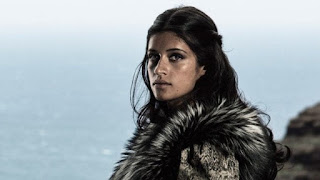"Oh man", my friend told me, her tone elated, when we came out of a screening of Ocean's 8,
"did you see that? They were eating constantly! And not even just tiny
bits of salad! But, you know, actual food." We nodded along and agreed
with her, just happy in that moment, but later I thought, how weird, how
strange it is that we find it remarkable that women in a movie were
shown eating.
***
Women’s appetites are often demonized, that is hardly a hot take. From media analysis, over poetry and art to political and feminist writings, a lot of women from different walks of lives have written on the subject. It isn’t just a media studies thing, far from it, it is a social justice issue as well, translated and refracted and spread through media.
Nevertheless, I want to share with you a part of my master’s thesis that deals with exactly that topic. I’ll be using excerpts from my thesis as well as additional sources, quotes and thoughts. Enjoy:
***
First off, some context. Women in society are often marked as other. Aliens in media are representative of the other, often of a specific type of human other. The construction of female aliens, therefore, makes symbolic statements about human womanhood. The alien woman discussed in the following is the Empress of Racnoss, the clear antagonist of the Doctor Who episode “The Runaway Bride”. She follows the other-as-enemy distinction, as Carl Malmgren formulates it (18). Using this strategy, the human other, for whom the alien is a stand-in, is dehumanized and presented as an enemy whose defeat is desirable. The other in science fiction, therefore, can be employed as a tool to reinforce desired societal norms. Norms that in Christian cultures often go back to the Bible, as Nina Coomes confirms when she observes that the hungry woman as the ultimate sinner is inextricably connected with Eve and her desire to know and to want and to eat.
The first look at the Empress of Racnoss, portrayed by Sarah Parish, shows her spider-like legs and her red lips and sharp teeth through which she hisses “I’ll eat you up” (28:18) when she sees the Doctor, mixing sexually suggestive language with animalistic intentions, the impression of which is strengthened due to the camera’s close-up focus on her mouth. Because the audience does not see her full face or body, she remains mysterious and monstrous – she is reduced to parts of her that seem threatening – and is, consequently, denied personhood. The empress is from the beginning onwards connected with hunger and desire, both visually and through dialog, and this hunger is also clearly characterized as threatening and abject.
Additionally, the Doctor proclaims the Racnoss to be aggressive omnivores, an statement confirmed through the visual focus on the alien mouth, marking the species as evil and, therefore, preemptively justifying any action taken against them. The Doctor’s description combined with the looks and staging of the empress serves to further dehumanize and alienate her. In combination with her earlier assessment of the Doctor, her “various appetites, be they procreative, literal, or carnal” and her “biological drives” (Rowson 93) are linked to her gender and presented as a threat, positioning a female focus on the body to be destructive. To hunger for anything while being female is to ask too much. It doesn’t matter if this appetite is for attention, sex, power or nourishment, it “always overreaches”, as Jess Zimmerman says in her examination of her own relationship to hunger, literal and emotional, “because it is not supposed to exist”.
It is, furthermore, notable that the alien mother is depicted without a husband or father of the children, centering her desire to procreate on her womanhood, and presenting her as different from the nuclear family ideal of heterosexual mainstream culture. This is how the depiction of the empress falls in line with a horror trope Cynthia Freeland calls “queen bugs” (70). The queen bugs combine “the primitive instinctual drive to reproduce with a tendency to dominate the male of the species” (Freeland 70). The empress being portrayed as a spider-like creature even implies that she consumed the father of the children as some spiders do. Her desire to procreate is, consequently, connected with her literal hunger and made fully her own. It can’t be excused as someone else’s in the same way eating alone in public forces you to own your hunger as Laura Maw describes.
In her evaluation of Alien (1979), Lynda Zwinger concludes that it insists “on a border between representations of the nurturing mother necessary to the middle-class bourgeois dominant culture and the transgressive power maternity might achieve if left to its own (supposed) desires” (74). This assessment can be applied to the empress as well, especially considering that her visual design is in part reminiscent of the xenomorph queen’s. Like the famous alien, the empress’ desire to consume and procreate and her obvious power to do so if not stopped, transgresses accepted boundaries and thus becomes a threat.
There is a compelling comparison to be made to Donna, whose exaggerated desire for companionship is ridiculed and ultimately the source of her suffering. As Jess Zimmerman notes, to want something for yourself as a woman, is to be seen as ‘attention-seeking’. Donna’s wanting is purposefully designed to be over-the-top, to be mocked and made the butt of a joke, something to laugh at, because how dare she actively pursue love.
It is significant here, that even though the empress has been consistently portrayed as a monstrous villain who needs to be defeated and has caused her personally harm, Donna is seen empathizing with the empress’ pain and being perturbed at the Doctor’s seeming unaffectedness. Even though the music takes on triumphant notes, the camera shows the scene in a Dutch angle, adding a sense of unease. Donna’s empathy for what is essentially a grieving mother links them in their womanhood.
In the end, the Doctor kills the Racnoss children with water and therefore puts an end to her procreative desire. The empress herself escapes by teleporting to her ship and vows revenge but is promptly killed by Earth’s military; her female abjection is thusly thoroughly defeated by male forces. Her excessive overreaching hunger could only be stopped by not allowing her to continue. Because a female creature whose appetite becomes uncontrollable is a monster like no other.
***
“The Runaway Bride.” Doctor Who, written by Russell T. Davies, directed by Euros Lyn, Special, BBC, 2006.
Freeland, Cynthia A. The Naked and the Undead: Evil and the Appeal of Horror. Westview Press, 2000.
Malmgren, Carl D. “Self and Other in SF: Alien Encounters.” Science Fiction Studies, vol. 20, no. 1, 1993, pp. 15-33.
Rowson, Emily V. Impossible Girls and Tin Dogs: Constructions of the Gendered Body in Doctor Who. 2017. University of Northumbria, PhD dissertation.
Zwinger, Lynda. “Blood Relations: Feminist Theory Meets the Uncanny Alien Bug Mother.” Hypatia, vol. 7, no. 2, 1992, pp. 74-90.
Extra sources:
Coomes, Nina. “On Eve’s Temptation and the Monsters We Make of Hungry Women.” Catapult, 15. Jul. 2019, https://catapult.co/stories/on-eves-temptation-and-the-monsters-we-make-of-hungry-women-nina-coomes
Maw, Laura. “There’s Nothing Scarier Than a Hungry Woman.” Electric Literature, 17. Oct. 2019, https://electricliterature.com/theres-nothing-scarier-than-a-hungry-woman/
(The title quote is from this essay.)
Zimmerman, Jess. “Hunger Makes Me.” Hazlitt Magazine, 7. Jul. 2016, https://hazlitt.net/feature/hunger-makes-me
























